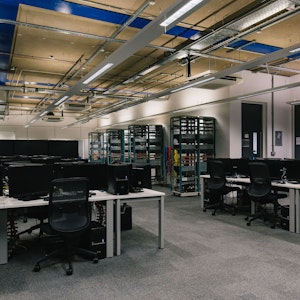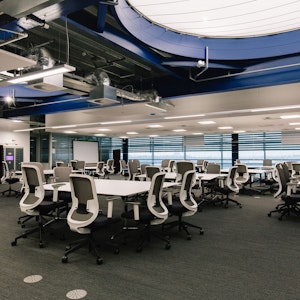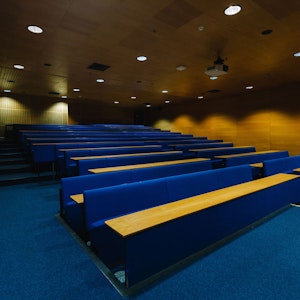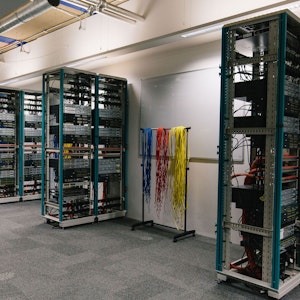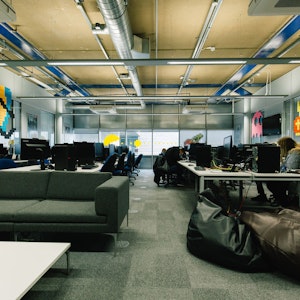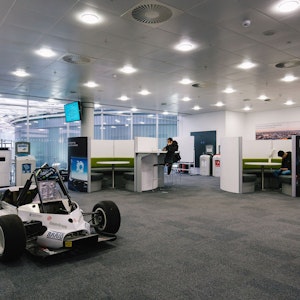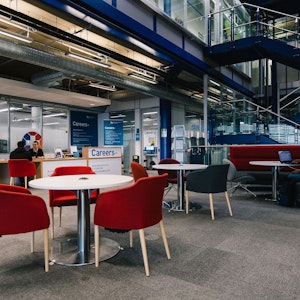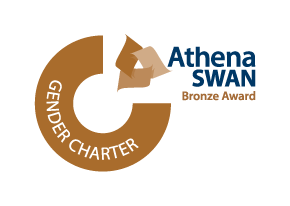
Computer Science with a Foundation Year - BSc (Hons)
Currently viewing course to start in 2024/25 Entry.
Do you want to develop the skills needed to be a leading IT professional? BSc Computer Science with a Foundation Year will develop your skills in producing computer systems solutions. You will gain a sound mathematical and scientific understanding alongside developing the professional attitude needed in industry....
- Level Foundation
- Study mode Full Time
- Location City Centre
- Award BSc (Hons)
- Start date September 2024
- School School of Computing and Digital Technology
- Faculty Faculty of Computing, Engineering and The Built Environment
This course is:
Open to International Students
Overview
Do you want to develop the skills needed to be a leading IT professional? BSc Computer Science with a Foundation Year will develop your skills in producing computer systems solutions. You will gain a sound mathematical and scientific understanding alongside developing the professional attitude needed in industry.
While studying your Computer Science degree with us, you’ll also have access to dedicated industry-standard facilities in a fully equipped lab running the latest software. Plus, we’re home to a Cisco Systems, a Microsoft Academy Centre and Amazon Web Services Academy (AWS), so you can rest assured knowing our university course will prepare you for a successful career in the industry.
About the Foundation Year
The Foundation Year course option enables you to study for our BSc (Hons) degree over an extended full-time duration of four years by including a Foundation Certificate (year one of four). The Foundation Certificate provides a broad study programme that underpins the follow-on degree. In order to progress to the next year of your degree, it is necessary to achieve a pass in all of the modules of the Foundation Certificate.

Introducing STEAMhouse
STEAMhouse is a centre for technology, innovation, creative thinking, prototyping and business development. Our brand new £70 million pound building is the new home for the School of Computing and Digital Technology.
What's covered in this course?
You will study the fundamental concepts of computer science, including computer programming, data structures and algorithms, information systems, computer networks and computer architecture.
You will consolidate your learning by studying advanced subjects that emphasise software engineering skills. You will also be introduced to topics such as operating systems, cyber security, discrete mathematics, and web application development.
Broaden your understanding of computer science by studying specialised subjects like artificial intelligence, cloud computing and wearable computing. In addition, you’ll complete an individual project in order to demonstrate your technical skills and general employability in preparation for your future career.
The individual project simulates typical workplace tasks that require in-depth knowledge and skills in a specific area of computer science. You’ll consider wider issues and develop the ability to manage activities and resources, as well as generate, implement and report on solutions to meet task objectives.
Throughout your studies, you’ll be supported by our expert teaching staff, all of whom have a wide range of research and industrial experience in areas such as computer security and software engineering, which they use to enhance the curriculum.
Thanks to our strong partnerships with the Linux Professional Institute (LPI) and the Oracle Academy, you’ll have enviable access to leading industry knowledge. This is complemented by the Cisco Systems and Microsoft Academy Centre, both of which are based here.
This course has been carefully designed to provide you with a comprehensive academic background that combines the professional skills that will set you apart from your peers.
You’ll be based at Millennium Point building at our City Centre Campus, where you’ll have at your fingertips an array of professional-standard facilities with which to develop your key practical skills and consolidate your academic learning.
Accredited By
This course is accredited by:
My studies helped me a great deal, they gave me the knowledge needed to be a successful developer and an all-round software literate. The great thing about my course is that it focused on all aspects of software which is a great attribute to have when searching for a job. Ansar Nazir
Why Choose Us?
- Brand new facilities at STEAMhouse - This state-of-the-art building is the new home for our Computing courses. Based at our expanding City Centre Campus, this unique centre will give you access to outstanding facilities and teaching spaces, as well as opportunities to collaborate with people and businesses across multiple sectors and work on real industry-based projects.
- State-of-the-art facilities - You will be based at our Millennium Point building, at City Centre campus that has recently had £6.5 million invested in IT facilities. You’ll be able to undertake work in artificial Intelligence, human computer interaction, mobile and web application development and project management.
- Home to Microsoft Academy Centre - We are one of Microsoft’s top UK university-based academics and a member of the Microsoft Developer Network Academic Alliance. This means we are able to use various Microsoft software products and online resources for research.
- Industry connections - We are also a Cisco ASC and one of only ten Cisco Instructor Training Centre’s in the UK. We have strong industry links with companies such as Apple, Oracle, LPI, Microsoft and AWS, to ensure that the course content remains up-to-date and is relevant to employers.
- Gain vendor certificates - Including LPI 1 Beta certification and Cisco networking certificates, while studying your degree.
Open Days
Join us for an on-campus Open Day where you'll be able to meet us in person. Booking for the next event isn’t open yet. Register your interest below and we’ll email you as soon as booking goes live.
Next Open Day: 29 June 2024
Entry Requirements
These entry requirements apply for entry in 2024/25.
All required qualifications/grades must have been achieved and evidenced at the earliest opportunity after accepting an offer to help confirm admission and allow for on-time enrolment. This can also include other requirements, like a fee status form and relevant documents. Applicants can track their application and outstanding information requests through their BCU mySRS account.
80 UCAS tariff points
If you have a qualification that is not listed, please contact us.
Fees & How to Apply
UK students
Annual and modular tuition fees shown are applicable to the first year of study. The University reserves the right to increase fees for subsequent years of study in line with increases in inflation (capped at 5%) or to reflect changes in Government funding policies or changes agreed by Parliament. View fees for continuing students.
International students
Annual and modular tuition fees shown are applicable to the first year of study. The University reserves the right to increase fees for subsequent years of study in line with increases in inflation (capped at 5%) or to reflect changes in Government funding policies or changes agreed by Parliament. View fees for continuing students.
Award: BSc (Hons)
Starting: Sep 2024
- Mode
- Duration
- Fees
- Full Time
- 4 years
-
TBC
Guidance for UK students
UK students applying for most undergraduate degree courses in the UK will need to apply through UCAS.
The Universities and Colleges Admissions Service (UCAS) is a UK organisation responsible for managing applications to university and college.
Applying through UCAS
- Register with UCAS
- Login to UCAS and complete your details
- Select your course and write a personal statement
- Get a reference
- Pay your application fee and submit your application
Course in Depth
Foundation Year
In order to complete this programme a student must successfully complete all the following CORE modules (totalling 120 credits):
The Foundation Mathematics module provides the basic knowledge and mathematical skills which will equip the students to continue their studies to an undergraduate programme. The module will be focused on mathematics related to the field of computing. The interactive taught sessions will use fundamental mathematical in discussions to broaden understanding of the theory and practice introduced in the module. Additional support materials will be made available on the module Moodle website.
Student engagement in the employment of interactive classroom activities and discussions will build the required confidence in maths This will enable students on this module without a strong background in mathematics to work at this level in fundamental mathematics.
This module will provide you with an understanding of the role of digital technologies in transforming industries and sectors. It will provide you with a comprehensive introduction to core concepts of science for digital technology, and an understanding of the fundamental aspects of science essential for studying and working with digital technologies.
You will learn systems thinking methodologies to model systems supported by digital technologies, enabling you to understand different aspects of technology, and to design your own solutions. Moreover, this module will help you to develop essential academic and personal study skills necessary for success in higher education. It will provide you with basic research, academic writing, and reflection skills. These skills are vital for your transition to higher education and will enhance your learning and academic growth.
This module provides the skills necessary to design a web based application around a clear understanding of the business information requirements, a structured design of an interface and the development skills necessary to implement a solution.
This module focuses on varied technologies relating to the design and development of application to meet the information needs of a business. The module will analyse and design an application that meets current web standards.
The module also provides an understanding of the history of the Internet, Internet technologies and applications to provide an appreciation of for the impact of the Internet on the production of business applications.
This module will provide you with an introduction to digital media technology and will allow you to explore technology-driven change in the media industry.
This module will introduce the fundamentals of audio / video capture and editing allowing you to explore workflow practices. You will document your development process, including aspects such as story-boarding and risk assessments and will create an artefact that relates to technology in your chosen degree or industry.
During the journey within higher education, developing your independent study is an essential skill to support shaping the knowledge to become more useful and applied within practice. This module aims to provide you with necessary skills and tips that should support you to work independently within your discipline and to successfully apply project management tools and techniques to a mini project related to your subject discipline.
Within the module, various tutorials, workshops and seminars will encourage the elements or creativity, innovation and thinking. The skills developed from this module acts as a foundation both towards subjects within your discipline, and more importantly, your final year’s project in Level 6.
This module will be supported with 2hrs of extra module support session.
Foundations of programming aims to provide you with the fundamental principles and practice-based activities needed to begin developing software programs. The module details the anatomy of a structured software program that includes the creation of a program algorithm, a logical, simple and organised program flow and the generation of pseudo and programming code. The module uses a combination of theory and practice-based sessions designed to engage students in group and individual activities to identify the components of a software program and to apply their knowledge into hands-on software programming activities. During the module sessions you will acquire the basic skills to design and create software programs.
This module will be supported with 2hrs of extra module support session.
Year One
In order to complete this programme a student must successfully complete all the following CORE modules (totalling 120 credits):
Within the module of Computer Programming you will learn the key skills of Programming and how this relates to technology and communications. Programming is an engineering tool that plays a vital role to drive most of the modern technologies surrounding us, including the technological devices for communication, transportation and entertainment. In other words, it can be said that our modern lifestyles are heavily dependent on programming. Moreover, businesses increasingly rely on computers and the software run on them. Programming skills and a broader and deeper understanding of programming are therefore becoming increasingly important to the jobs market.
This introductory computer programming module provides the underpinning knowledge and practice for computing students to design, build and test software components. The module will make use of practical sessions primarily to allow you to apply programming principles and constructs in order to creatively solve problems by means of developing small programs. Module content and assessment enables learners to acquire programming skills in a modern imperative language.
This fundamental computer systems module puts into practice the learning done through reading, video lecturers, skills building labs and problem based learning for the acquisition of new knowledge and core practical competencies. Module content and assessment encourages realisation of multi-disciplinary computing, it challenges students to interface with the environment by configuring Internet of Things devices and systems for collecting data for the proposed solution.
This module provides the underpinning skills necessary to develop an effective web based information system based around a clear understanding of the visual requirements of an interface, a structured design approach and the technical skills necessary to implement a solution.
Data structures and algorithms are essential in computer science, software engineering, and computer games and graphics programming. Data structures are structured representations of data; the design of a data structure determines how operations (such as reading to, writing from, modifying, or computing with the data) can be achieved. An algorithm is a set of instructions which can be followed in order to solve a computational problem.
This module will equip you with the necessary background knowledge about common data structures and algorithms. It will develop your skills for writing them, and analysing their efficiency and correctness. You will cover topics such as how computers represent and operate on arrays, lists, sets, queues, stacks, graphs and networks, as well as how to write and analyse algorithms.
The module provides the opportunity to learn and critically reflect the skills required in building and designing basic networks and their requirements within a network infrastructure. This module builds on the underpinning knowledge and theory of networking systems.
This first-year project allows you to develop and cultivate a creative mind-set through collaborative innovative practice, allowing you to bring together knowledge and imagination to construct a viable product. It is an opportunity to express your ideas, skills and talent to the wider community of innovative practice.
Year Two
In order to complete this programme a student must successfully complete all the following CORE modules (totalling 120 credits):
Programming is an engineering tool that plays a vital role to drive most of the modern technologies surrounding us, including the technological devices for communication, transportation and entertainment. In other words it can be said that our modern lifestyles are heavily dependent on programming. Moreover, businesses increasingly rely on computers and the software run on them. Programming skills and a broader and deeper understanding of programming are therefore becoming increasingly important to the jobs market.
This module will provide an introduction to fundamental concepts associated with operating systems and will lay the foundations for other Computer Science modules that will require a broad understanding of operating systems principles. A good understanding of operating systems is very important for computer scientists in order to design efficient solutions to a wide range of programming problems including concurrent programming, resource management and performance analysis.
This module will initially introduce the key components of operating systems, their role and purpose, and historical background. The module will also cover core themes such as concurrency, scheduling, memory management, security, virtual machines, device management, file systems, and real time and embedded systems. It will combine theoretical concepts and fundamentals with practical exercises that will provide hands-on experience in understanding, managing, and manipulating operating systems.
This module embeds core discrete mathematics concepts relevant to programmers, within the context of programming. We will use sound abstract reasoning techniques to design and produce computer programs within the declarative paradigm. Finally, these solutions will be tested and evaluated against their functional requirements using a number of testing and verification techniques.
The vast majority of web applications are connected to databases for the purpose of storing and retrieving information. On this module you will be introduced to relevant concepts and technologies, applying them to the development of such applications.
You will gain knowledge and skills concerning data modelling (entity-relationship models) and relational database implementation and administration (using SQL). You will also acquire new programming skills (e.g., writing server-side scripts in PHP) in order to produce applications that provide useful functionality. You will also gain practical experience in the use of web frameworks to develop web applications to enhance your employability skills.
Computer Scientists need to address the realities of the application of their field within an environment where cyber security threats present unique challenges to application and system developers, in relation to the requirement for secure design and operation. This module provides a foundation for security consideration as required in the design of software expected to perform within a networked and data sharing environment. This module has been designed to provide the necessary theoretical framework, foundations and practical support for effectively pursuing security solutions with reference to the requirement for secure application development.
This module is about software engineering with a focus on software design. It covers three stages of the software engineering life-cycle, requirements, design and implementation, but with a focal point on design and an emphasis on the design theme. The module provides the necessary skills to: (i) construct models of requirements and designs, (ii) synthesise implementations from design models, (iii) and apply software design patterns. The standard UML is used as the modelling language, the vehicle through which important design concepts are explored to convey a software engineering ethos based on getting it right by adequately studying the problem and mindfully constructing designs of software solutions.
Year Three
In order to complete this programme a student must successfully complete all the following CORE modules (totalling 120 credits):
The purpose of the module is to enable you to undertake a sustained, in-depth and research-informed project exploring an area that is of personal interest to you. In agreement with your supervisor, you will decide upon your topic which will take the form of a practical outcome (artefact) with accompanying contextual material. The main consideration when choosing your topic is that it must be aligned to the programme you are studying, and you should consider the relevance of this topic to your future academic or professional development.
At this level, you will be expected to work independently but you will receive additional one-to-one support from your supervisor, who will be familiar with your chosen topic area. As you progress on the module, extra support will be available and this may take the form of group seminars, workshops and online materials that will help to develop your project.
This module will focus on combining theoretical concepts around user experience design with practical “hands-on” approaches used widely in industry and academia to create effective interactive experiences.
You will learn about the user-centred design process that places a core emphasis on designing products, applications, and software for “people”. In particular, you will learn techniques for gathering and understanding a target audience’s requirements, the importance of universal design and accessibility, and methods for undertaking rapid prototyping.
An emphasis will also be placed on gaining practical experience in designing and conducting usability studies, as well as how to incorporate key findings back into the design process. You will apply this knowledge to design and evaluate an innovative digital prototype using industry standard tools.
One of the major objective of the computer science course is to introduce the theory, principles and technologies underlying the construction of modern computing systems. This module introduces Cloud Computing, which is the technology that enables on-demand computing resources (everything from applications to data centres) over the Internet.
This technology has revolutionized modern computing by allowing users to access infinite pool of computing services and resources on a pay-per-use basis. This module introduces the fundamental concepts and technologies related to cloud computing architecture, platforms and services. The module follows a practical approach to equip the students with hands-on experience of cloud computing by using a public Cloud service, such as Amazon Web Services.
Mobile technologies, particularly in the form of smart phones, are now the de-facto mode for us to communicate and navigate information. Building on this success, wearables have the potential to make computer technology ubiquitous. Although encompassing many forms, probably the most prevalent example of wearables is seen in the emergence of powerful ‘smart watches’.
This module explores the direction mobile and wearable technologies are taking and aims to equip students with the essential design and programming skills to develop their own robust, usable and ubiquitous applications for at least one of the most popular mobile and smart watch platforms (such as Google’s Android / Wear and Apple’s iOS / watchOS).
Artificial Intelligence (AI) is a core component of computer science, aiming at developing intelligent agents that mimic human’s cognitive capability in learning, reasoning, and problem solving. As a branch of AI, machine learning (ML) allows to create software that adapts and learns (from examples), rather than being explicitly programmed for a particular outcome. Both AI and ML rely on managing, processing and analysis of large datasets, something that Data Science (DS) is concerned with. Many services provided by technology giants such as Google, Microsoft, IBM, Facebook, Amazon, etc. are powered by DS, ML and AI. The recent advances in these subjects have already led to significant industrial applications such as self-driving cars and Industry 4.0.
Download course specification
Download now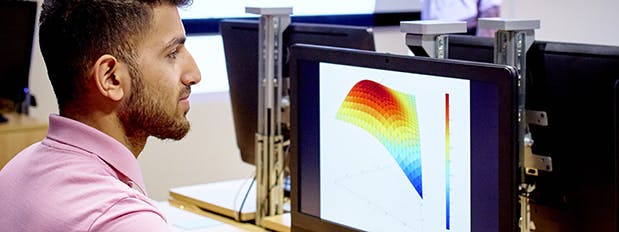
Knowledge and understanding are acquired though a mixture of formal lectures, tutor-led seminars and practical activities, with other independent learning activities at all stages.
Emphasis is placed on guided, self-directed and student-centred learning with increasing independence of approach, thought and process.
The course provides access to effective commercial development environments and ensures students have practical awareness of computer systems requirements. You are required to meet strict deadlines, and to manage and plan your overall workload.
Knowledge is assessed formatively and summatively, by a number of methods, including seminars, course-work, viva, presentation, interactive automated assessment, formal examination and project work.
Assessment criteria are published both at a generic course level and to provide guidance for individual items of assessment. Anonymous marking systems are in place for all formal examinations.
You will undertake a major project involving research and application of that research in the solution of appropriate systems problems.
Attendance requirements
For more information on attendance requirements, course contact time and suggested self-study hours, download the course specification.
Student stories

Marcus Miller
Marcus Miller always had an interest in computers but a boarding school education saw that fade. After a few years in employment, he rekindled his passion – undertaking a Computer Science degree at Birmingham City University. Since then, he has set up his own successful SEO consultancy company, Bowler Hat.
Marcus enjoyed every element of his course; almost having too much fun. He had some great teachers and was generally very inspired. Our Computer Science BSc (Hons) course sparked his interest in web technologies, which led to the creation of Bowler Hat.
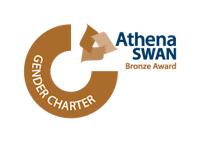
Athena Swan Bronze Award
We have successfully secured the Athena SWAN Departmental Bronze Award recognising a commitment to gender equality.
The Athena Swan Charter is a framework which is used across the globe to support and transform gender equality within higher education (HE) and research.
Employability
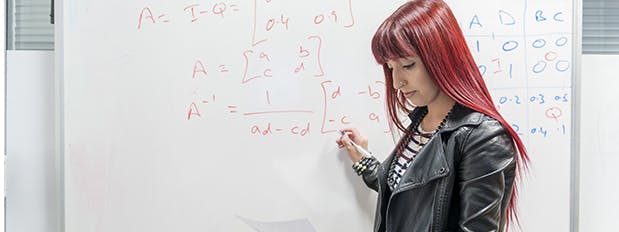
Enhancing your employability skills
Our graduates typically design and implement software across such rewarding areas as web development, interface design, security issues and mobile computing.
We know that employers are looking for graduates who have a good balance between in-depth academic knowledge and technical and practical expertise, which is why our course is geared towards employability.
What you learn on our course will help you to stand out when you look for your first professional role and because you’ll know how to use sophisticated, industry-standard equipment and software, you will be able to demonstrate that you can put into practice your deep theoretical knowledge.
We will also prepare you for a career by equipping you with myriad transferable skills, such as complex problem-solving expertise, the ability to analyse in a careful and considered manner, and working as a team member.
In addition, our specialist industry links with the Linux Professional Institute, the Oracle Academy, Cisco, and Microsoft, Apple, and Oracle, plus our world-class facilities, will mark you out as a highly employable graduate.
It’s why our graduates have gone on to pursue computing and software development and designer careers in a wide range of industries, from SME software companies, to industry, government, banking, and healthcare.
Further Study
Successful completion of the course can open up opportunities for employment in IT industry, but you may think to continue your studies at postgraduate level, studying a computer science subject in greater detail by means of MSc or PhD.
Although postgraduate study may appear essential for a career in academia, recent statistical evidence shows that it can also be useful for a range of other careers. For example, in 2014 the Department of Business, Innovation and Skills noted that someone with a Master’s degree earns on average £9,000 more per year than someone with a degree qualification.
According to the UK Commission for Employment and Skills (2014) observation, one in seven jobs will require a postgraduate qualification by 2022. All these facts indicate the contribution of postgraduate study to employability is increasingly significant.
Placements
We aim to have you employer-ready by the time you graduate and, as part of your Computer Science course, you have the option of undertaking an industrial placement after the second year of study.
If you decide to do this, it will extend the duration of your course to four years.
Thanks to our excellent partnerships and working relationships with some of the UK’s leading companies, you have the chance of undertaking a high-quality industrial placement with leading organisations such as IBM, Dignity Plc, Mortgage Brain, and Griffiths-Waite.
Learn more about some of the prestigious organisations that our students are placed with:
Full details can be found on the School placements page.
International
Birmingham City University is a vibrant and multicultural university in the heart of a modern and diverse city. We welcome many international students every year – there are currently students from more than 80 countries among our student community.
The University is conveniently placed, with Birmingham International Airport nearby and first-rate transport connections to London and the rest of the UK.
Our international pages contain a wealth of information for international students who are considering applying to study here, including:
- Explore some of the good reasons why you should study here.
- Find out how to improve your language skills before starting your studies.
- Find all the information relevant to applicants from your country.
- Learn where to find financial support for your studies.
Facilities & Staff
Our Facilities
We are constantly investing in our estate and are currently in the process of spending £260 million on new learning facilities. This course will be taught at Millennium Point at the City Centre Campus.
The course is supported with a wide range of cutting-edge facilities in the City Centre Campus. We have a state-of-the-art computer games technology lab which contains high-performance PCs, Sony PlayStation development kits and a range of industry standard software including Unity, Unreal and a suite of professional Microsoft development tools.
We also have many open access areas where students can study together and even hire out laptops for use in these spaces and others within the university.
Within the University there are many internationally recognised research teams giving you the opportunity to collaborate with them on exciting interdisciplinary projects.
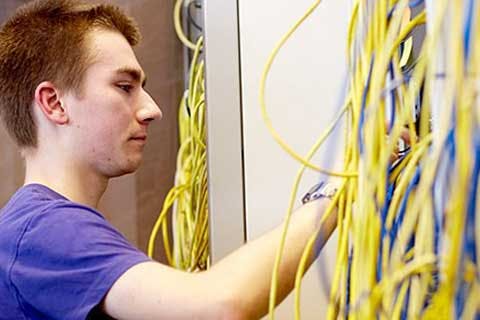
Computer networking
The laboratories are well-equipped for all our computer networking courses, as well as specialist areas for practical work such as voice-over internet protocol (VoIP), forensic and ethical hacking technologies, wireless and mobile technologies and radio frequency identification technologies to name but a few.
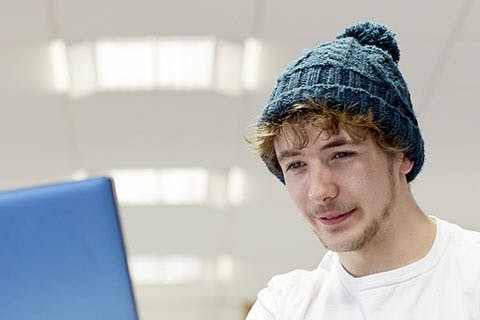
Software development and computer programming
There are a number of open access, software development and computer programming laboratories that can be used to develop systems and programmes, including database management systems such as MySQL, to name but a few.
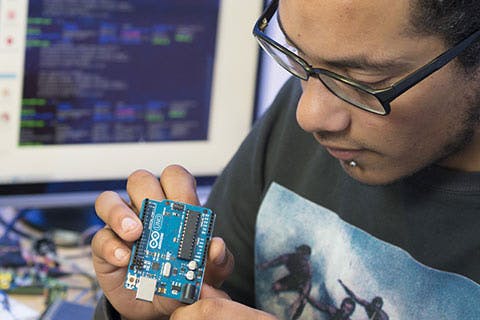
Systems laboratories
Our embedded systems laboratories are used to develop real-time systems, such as specialist hardware training and development resources, and industrial-standard software development and simulation tools. These include microcontroller software and robotics design and development, to name but a few.
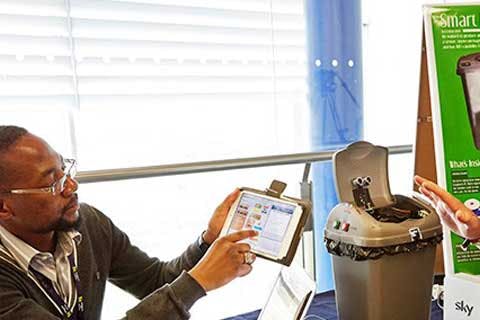
Electronic systems
To underpin the basic principles of electronic systems, we have a well-equipped laboratory of general and specialist test and measurement kits, including powered prototyping development boards, dual power supplies, frequency generators and counters and digital multi-meters to name but a few.
Forensic computing
Our successful development of forensic computing has led to a specialist forensics laboratory that is fully equipped with essential hardware and software for this sensitive area of study. The laboratory includes high-spec PCs with built-in multi interface Tableau write blockers, EnCase and FTK computer forensic software and steganography detection and analysis software, to name but a few.
More on our facilities
Our staff
Dr Khaled Mahbub
Associate Professor in Software Engineering
Khaled started his academic career, in September 1999, as a Lecturer (US hierarchy) in Computer Science & Engineering at the Department of Computer Science and Engineering, Ahsanullah University of Science and Technology, Dhaka, Bangladesh, where he worked until March 2001.
More about KhaledRon Austin
Associate Professor
Senior lecturer Ron Austin is the Associate Professor of the MSc Advanced Computer Networks course and teaches all network-related courses. His expertise and areas of interest include: Voice Over Internet Protocol (VoIP), security technologies, and forensic and ethical hacking.
More about RonHarjinder Singh
Senior Lecturer
Harjinder is a Senior Lecturer in the School of Computing and Digital Technology. He joined Birmingham City University (BCU) in 2000 and has 10 years experience in teaching and consultancy, prior to joining BCU Harjinder worked in Industry as a software developer mainly in C++.
More about Harjinder